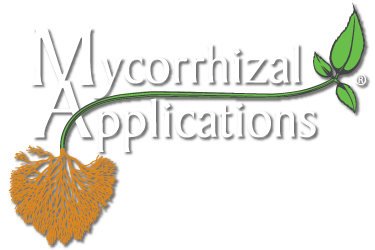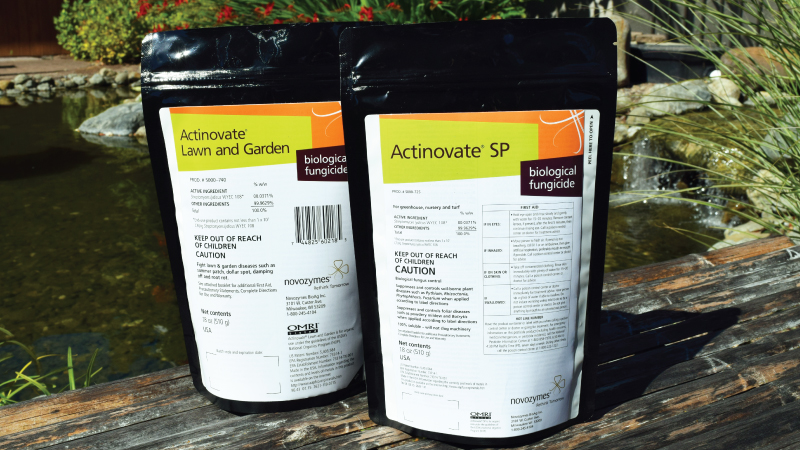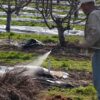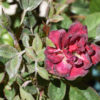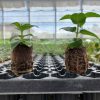The emphasis on communication between growers and the allied industry suppliers who create supporting products is equally important as the symbiotic relationships plants make with soil organisms. The more professional growers share their success stories, struggles and observations, the more effectively we can work together to provide a holistic approach to plant health without having to sacrifice the health of the environment. Through this communication, research, and grower demand, biologically based pesticides have hit the market with full force, offering environmentally sustainable plant heath efficacy at a cost that hides in the shadows of the natural benefits they provide.
ACTINOVATE is a proactive biorational fungicide offering a cornucopia of benefits for a healthier crop and more sustainable pest management program. The active ingredient is a symbiotic beneficial bacterium, Streptomyces lydicus WYEC 108, which preforms as a key player in prevention and treatment of soil borne and foliar diseases. With many modes of action combating a wide range of soil and foliar fungal diseases, ACTINOVATE can be used in almost every facet of the agricultural and horticultural industry, including the home garden. Using this fungicidal profile will not only reduce disease pressure, but also promote healthy root growth, nutrient uptake, and development of a stronger and healthier plant.
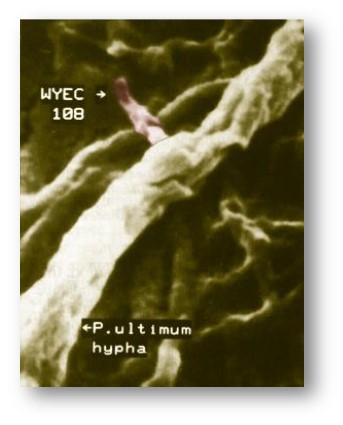
Streptomyces lydicus strain WYEC 108 (S. lydicus)
What are Streptomyces Lydicus WYEC 108’s Modes of Action?
OMRI listed ACTINOVATE shows efficacy in biocontrol with several preventative and curative measures. The primary mode of action of S. lydicus is the physical action of colonizing plant structures. It then occupies the open space when introduced into the root zone or applied to foliage, preventing pathogens from entering and colonizing these areas. This is where it forms its mutually beneficial symbiosis by feeding off the plant’s waste and secreting beneficial byproducts, each offering their own plant benefits and pesticidal modes of action.
Chief among these beneficial S. lydicus secretions is a compound called Chitinase, which can attack present pathogens through contact . This enzyme breaks down cell walls and other structures composed of chitin and can disrupt the reproductive cycles of pest fungi, preventing outbreaks in your crops. It can also aid in degrading arthropod and zooplankton cells as well.
In conjunction with killing off present pathogens, another primary method of prevention using this product is allowing the S. lydicus to “out-compete” other pests for nutrients. One of the helpful exudates of the beneficial bacteria are Iron siderophores. These microbes trap available iron, along with other nutrients that would otherwise feed pest pathogens and feeds it to the host plant. Doing so, it starves the unwanted pathogens and prevents future colonies from occurring.
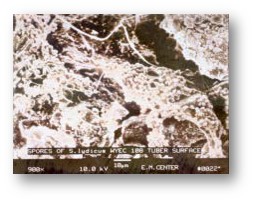
S. lydicus germinating as tiny bulb-like objects on cut potato piece
How does S. lydicus Survive in the Soil and Foliage of the Plant?
Streptomyces lydicus survives on root secretions from the host plant. Additional tradeoffs in this symbiotic relationship are the bi-products formed by the bacteria. The plant feeds the bacteria and in turn, the bacteria metabolizes the secretions and converts them into toxins through antibiosis. These toxins repel pest growth by changing soil environment conditions.
How is Actinovate Applied?
ACTINOVATE can be incorporated into soils with bio-stimulants such as mycorrhizae and other beneficial microorganisms for optimal plant health as well as prevention and tolerance of disease. Soil drenches and foliar applications are the most common methods of Actinovate use. As with any chemical or biological pesticide, there are very clear parameters to acknowledge to promote efficacy:
- Biologicals must be used preventatively. They require time, temperature and moisture to proliferate. Higher temperature and humidity make for faster colonization
- Application is rainfast in 2 hours
- Germination occurs within 4 hours and takes 3-4 days to fully colonize leaf surfaces
- Multiple applications at lower rates are better than fewer applications at higher rates
- Bacteria are degraded by UV light, so apply in the morning, evening or on cloudy days.
- New leaf growth is not protected by S. Lydicus Routine applications are required for long term coverage.
Application rates vary depending on crop species, cycle, and environment, as well as soil vs. foliar applications. Multiple methods of applications are described on the ACTINOVATE label, in order to offer growers and home gardeners application versatility.
What fungal diseases are prevented and suppressed by Actinovate?
SOIL DISEASES:
- Club Root
- Damping Off
- Gray Snow Mold
- Pink Snow Mold
- Root Rot
- Turf Brownpatch
- Turf Dollarspot
- Turf Take-All Patch
FOLIAR DISEASES:
- Bacterial blast
- Bacterial spot
- Black spot
- Citrus canker
- Downy mildew
- Fire blight
- Gray mold
- Leaf spots and rusts
- Peach leaf curl
- Powdery mildew
- Walnut blight
What are the Other Benefits of Actinovate?
Using bio-fungicides such as ACTINOVATE greatly reduces the likelihood of pesticide resistance. Unlike conventional pesticides that attack one or two biological processes and rely on rotations of chemicals to reduce resistance, this bio-rotational method has full spectrum control in the biological, cultural, and environmental sectors of a pest management program. They kill unwanted pests with biological predation, cultivate mass to outcompete unwanted fungal growth and make soil environments inhabitable to pests through antibiosis. The benefits of this product are not only reflected by the health of the plants, but also in the safety of employees and ease of implementing it into any production size and style. A few grower benefits of using ACTINOVATE include:
- Generally non-toxic, low likelihood of phototoxicity
- Minimal PPE
- Short REI (0-4 hours)
- 0-day pre-harvest interval
- Generally, MRL exempt
- 12-month shelf life (beginning 1/1/2019)
- Used on fruits & vegetables, lawns & turf, bedding plants, perennials & annuals, trees, and more
Aside from the powerful protection that Actinovate offers your plants, you can also become an advocate for healthy soils and happier crops by choosing biological and biorational options. It all begins by understanding the vast connections plants have with naturally occurring microorganisms. We cannot encourage you enough to practice the following: Use biological technology available today to become the shepherd of your growing operation. Strive to be active in environmental health and safety while being innovative in pest management. Use the benefits presented to you with Actinovate.
Actinovate has been on the market for many years, and it continues to be a popular biological fungicide due to its performance. Including Actinovate in your tool box will give you a powerful tool in your arsenal to combat the ever-present fungal predators.
Questions?
Please review our Actinovate Frequently Asked Questions section for more info: https://mycorrhizae.com/actinovate-faqs/
Article by: Alexander Way, Mycorrhizal Applications Sales Account Manager
November 19, 2018
© 2018, by Mycorrhizal Applications LLC
